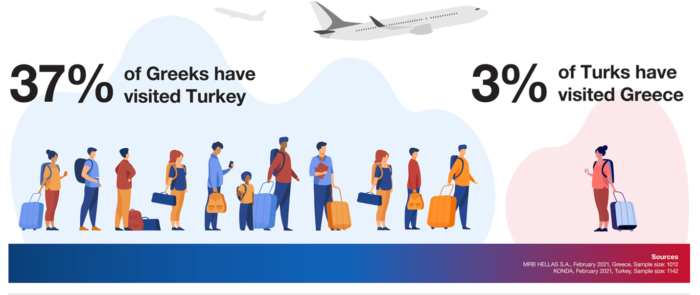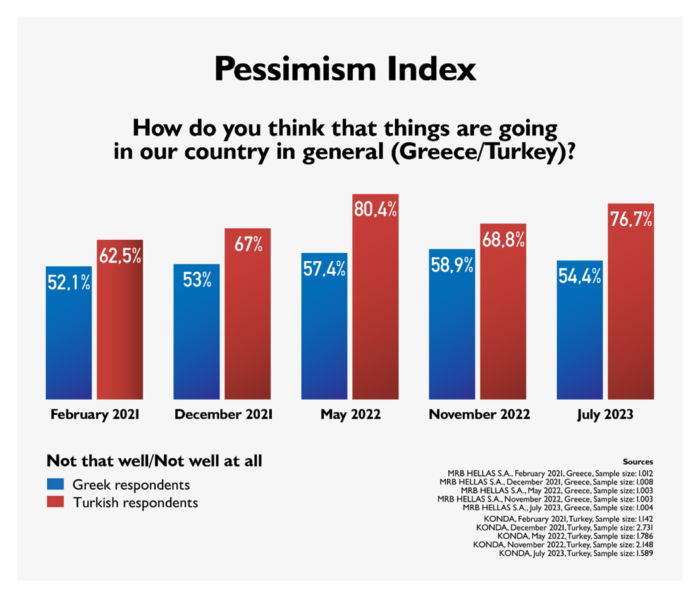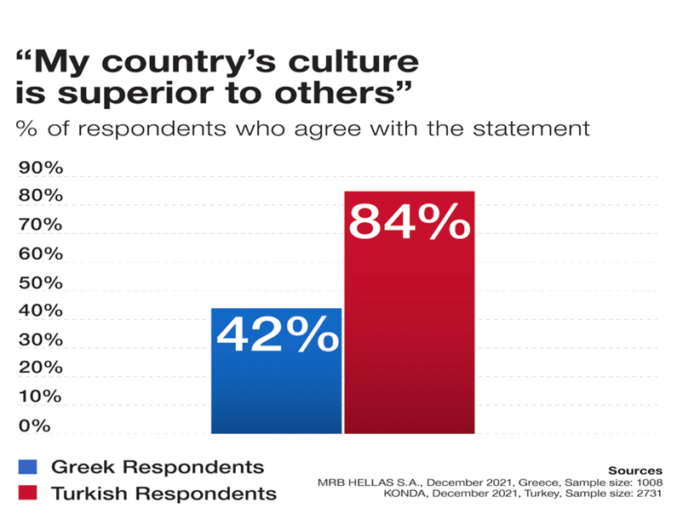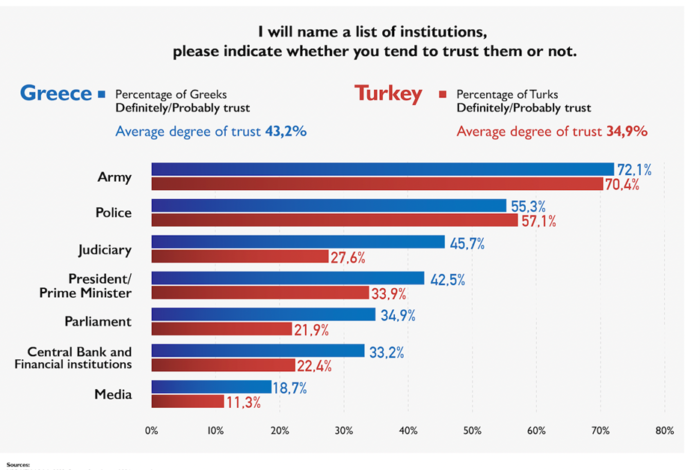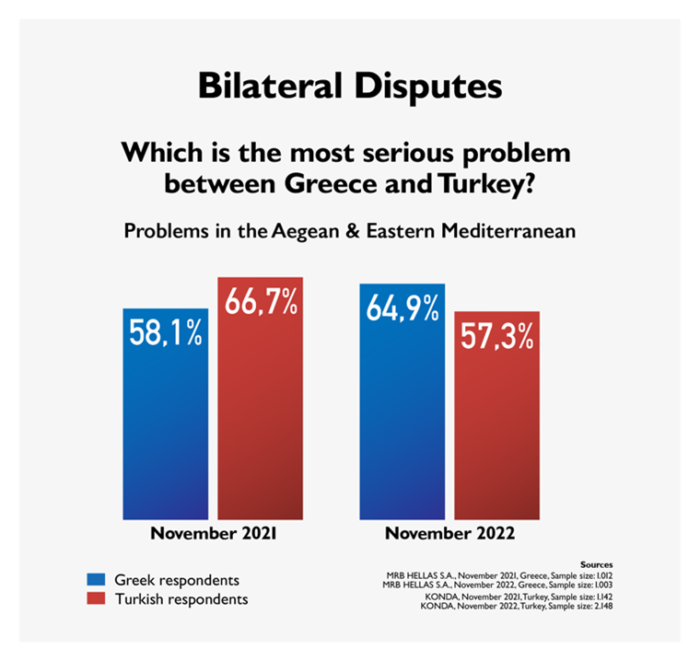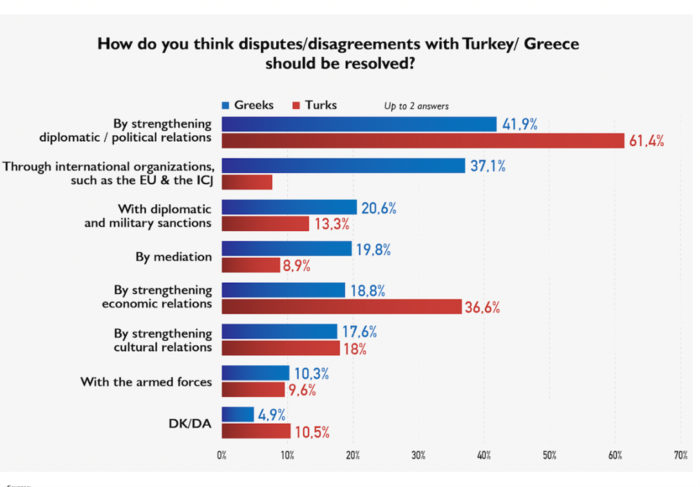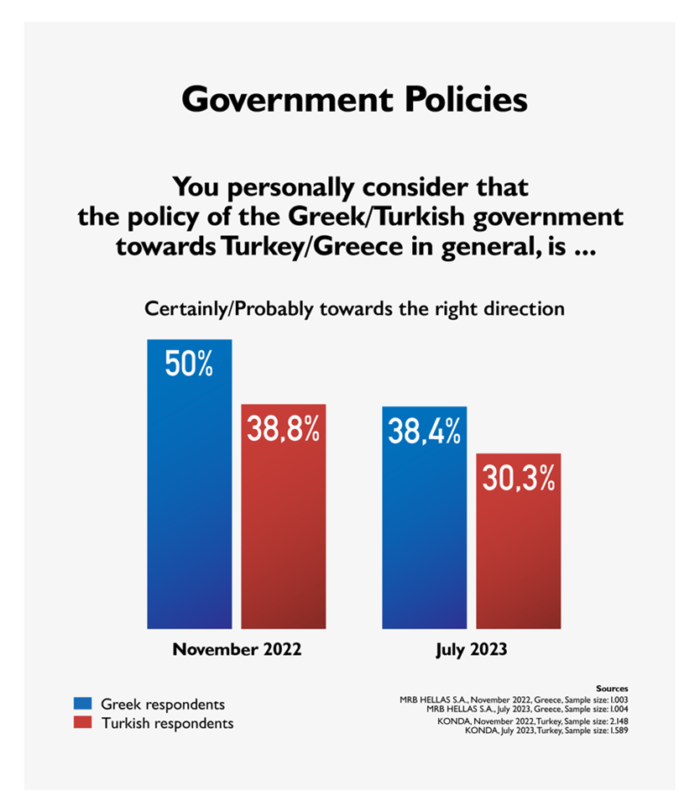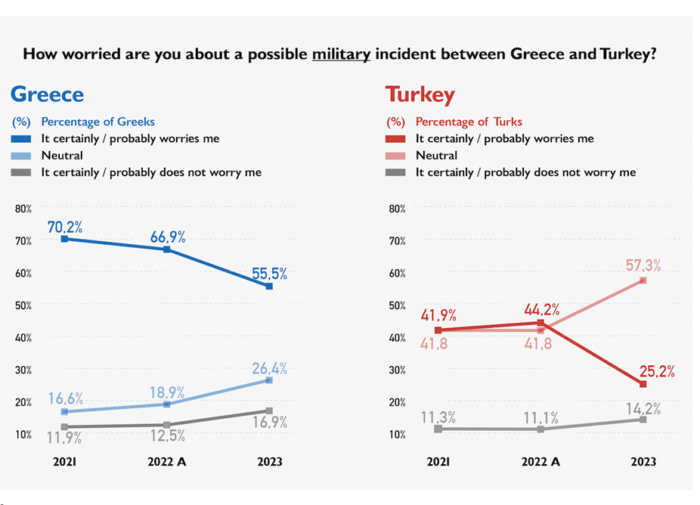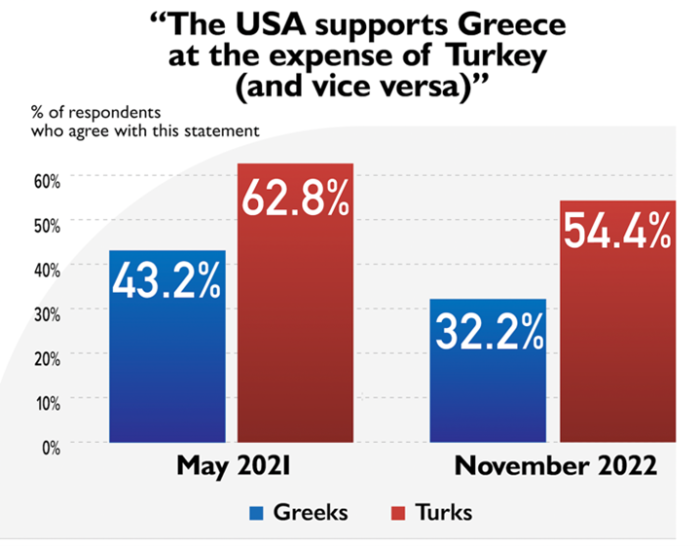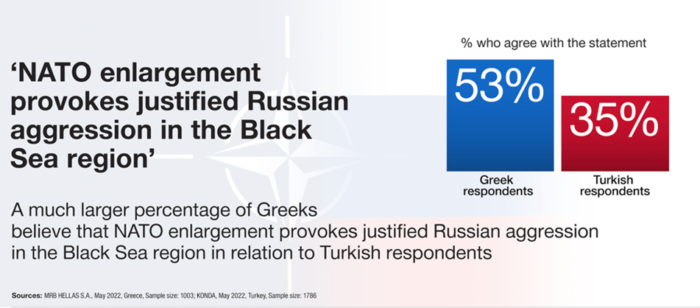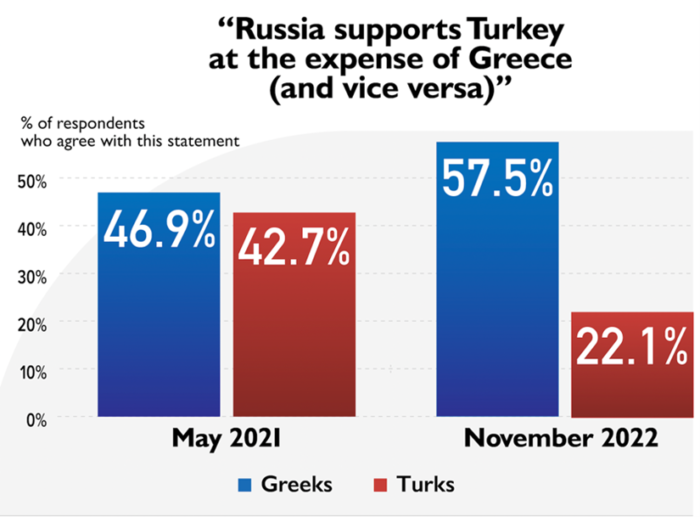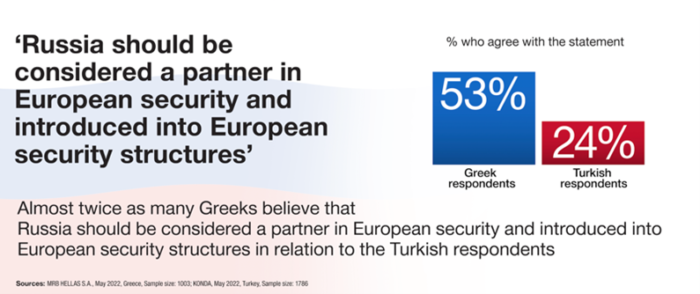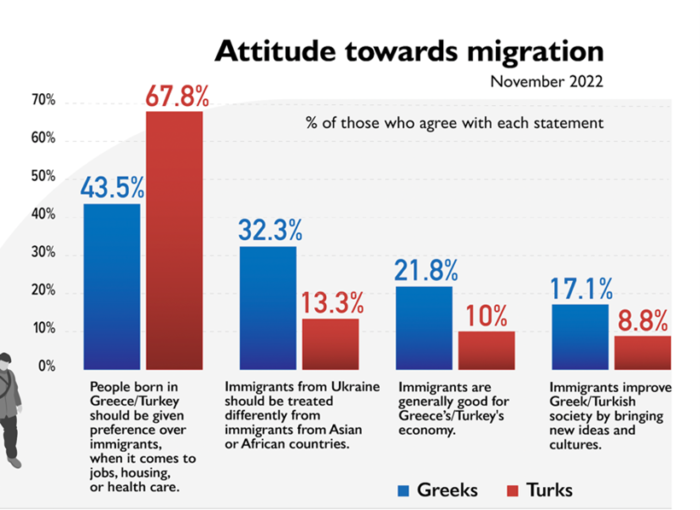- ELIAMEP joined forces with IPC with the support of DiaNEOsis to organize the first joint Greek-Turkish public opinion survey series.
- Five rounds of surveys were conducted concurrently in both countries, exploring cooperation, conflict, nationalism, perceptions, multilateral institutions, and societal linkages.
- A strong preference was recorded for peaceful means of conflict resolution, with variations in emphasis on bilateral talks and multilateralism.
- The presence of Turkey in the Greek public sphere is much stronger than the presence of Greece in the Turkish public sphere.
- Greek views of Turkey are more coherent compared to Turkish views of Greece.
- Religiosity is a significant indicator of attitudes towards the other side.
- Both public opinions are sceptic regarding the role of international actors, as there is concern about their bias in favour of the other side.
This study is based on the results of the first joint Greek-Turkish public opinion survey series organized by ELIAMEP and IPC and supported by DiaNEOsis. Through its five waves, this survey has identified similarities, differences and dynamics in the views Greeks and Turks have of each other and of Greek-Turkish bilateral disputes; their views about their own country’s position in the world, its relations with the European Union, the United States and Russia; as well as their perceptions of domestic institutions and the future both of their country and of themselves. The study highlights the fact that, despite the escalation in Greek-Turkish relations since 2018, most Greek and Turkish respondents displayed a preference for non-violent means of conflict resolution, even though they disagreed about both the root causes of the bilateral disputes and the appropriate solutions.
Read here in pdf the working paper by Evren Balta, Chair of the Department of International Relations, Özyeğin University and Ioannis N. Grigoriadis, Associate Professor, Department of Political Science and Public Administration, Bilkent University; Head, Turkey Programme, ELIAMEP.
Introduction
The historical backdrop to Greek-Turkish relations reveals a narrative that transcends mere geographical proximity. Both nations have defined themselves in terms of what the other is not and engaged in collaborative endeavours and contentious disputes. As NATO members and allies, Greece and Turkey are bound by a collective security alliance that underscores the importance of collaboration in the face of shared strategic challenges. But the bilateral ties between Greece and Turkey carry implications that transcend regional dynamics. Turkey’s candidacy for European Union (EU) membership, a pivotal dimension of Turkey’s foreign policy aspirations, is also deeply influenced by the need for harmonious and cooperative ties with Greece.
In 2021, ELIAMEP teamed up with Istanbul Policy Center (IPC) with the support of DiaNEOsis to explore the nuances of public opinion in the two countries.
In 2021, ELIAMEP teamed up with Istanbul Policy Center (IPC) with the support of DiaNEOsis to explore the nuances of public opinion in the two countries. Together with two leading public opinion companies, Greece’s MRB and Turkey’s KONDA, five rounds of surveys were conducted concurrently in both countries for the first time. The surveys probed into matters central to the interests of both countries, encompassing themes of cooperation and conflict, levels of nationalism and enmity, perceptions of the self and the other, evaluations of multilateral institutions, and societal linkages (see Table I for details of these surveys).
| Table I: Summary Information on Survey Waves (2021-2023) | ||||
| Survey No | Date | Country | Sample Size | Main Themes |
| 1 | February 2021 | Greece | 1012 | General situation in the country & Personal situation; Perceptions, cultural proximity, relations between Greece & Turkey; Perceptions of geostrategic interests and overall policy; Problems between Greece & Turkey and foreign policy; The international factor; The possibility of confrontation; The role of religion |
| 1 | February 2021 | Turkey | 1142 | General situation in the country & Personal situation; Perceptions, cultural proximity, relations between Greece & Turkey; Perceptions of geostrategic interests and overall policy; Problems between Greece & Turkey and foreign policy; The international factor; The possibility of confrontation; The role of religion |
| 2 | December 2021 | Greece | 1008 | General situation in the country & Personal situation; Perceptions, cultural proximity, relations between Greece & Turkey; Perceptions of overall policy; Degree of “pride” – functioning of institutions and achievements; The role of religion |
| 2 | December 2021 | Turkey | 2731 | General situation in the country & Personal situation; Perceptions, cultural proximity, relations between Greece & Turkey; Perceptions of overall policy; Degree of “pride” – functioning of institutions and achievements; The role of religion |
| 3 | May 2022 | Greece | 1003 | General situation in the country & Personal situation – Optimism Index; Similarities and differences between Greece & Turkey; US & NATO today; the EU and Greek-Turkish relations; The war in Ukraine; The role of religion |
| 3 | May 2022 | Turkey | 1786 | General situation in the country & Personal situation – Optimism Index; Similarities and differences between Greece & Turkey; US & NATO today; the EU and Greek-Turkish relations; The war in Ukraine; The role of religion |
| 4 | November 2022 | Greece | 1003 | General situation in the country & Personal situation; The problems and the foreign policy of the two states; Perceptions of overall policy towards the other country; The relationship with the EU and the Cyprus problem; Views about refugees |
| 4 | November 2022 | Turkey | 2148 | General situation in the country & Personal situation; The problems and the foreign policy of the two states; Perceptions of overall policy towards the other country; The relationship with the EU and the Cyprus problem; Views about refugees |
| 5 | July 2023 | Greece | 1004 | General situation in the country & Personal situation; Relations between the 2 states after the 2023 & 1999 earthquakes; Perspectives on disaster response; Perceptions on need for improvement in bilateral relations and the recent elections; The problems and the foreign policy of the two states; Degree of trust in institutions |
| 5 | July 2023 | Turkey | 1589 | General situation in the country & Personal situation; Relations between the 2 states after the 2023 & 1999 earthquakes; Perspectives on disaster response; Perceptions on need for improvement in bilateral relations and the recent elections; The problems and the foreign policy of the two states; Degree of trust in institutions |
This report illuminates the unfolding trends witnessed over the past three years; a period marked by a discernible downturn in Greek-Turkish relations.
This report illuminates the unfolding trends witnessed over the past three years; a period marked by a discernible downturn in Greek-Turkish relations. During this time-frame, the ties between the two states have been subject to considerable strain, with prominent issues including disputes over the Aegean Sea and the Eastern Mediterranean and migration. In summer 2020, concern grew among analysts who wondered whether these longstanding tensions might push Greece and Turkey to the brink of a major conflict. Compounding the situation, diplomatic channels found themselves closed, further complicating the prospects for resolution and dialogue between the neighbouring states.
Against this backdrop, a significant diplomatic event took place on 7 December 2023, when Turkey’s President Recep Tayyip Erdoğan made his first visit to Athens in six years. The historic visit culminated in the signing of the “Athens Declaration” by Greece and Turkey, a joint statement signalling a commitment to fostering good neighbourly relations. Greek Prime Minister Kyriakos Mitsotakis expressed a sense of “historical responsibility” for making use of the opportunity to bring the two states together, aligning their interests as closely as their shared borders. In a noteworthy display of diplomatic progress, ministers representing both states signed fifteen accords, a development widely regarded by analysts as indicative of the ground-breaking nature of President Erdoğan’s visit.
Our study thus highlighted issues that remained unchanging amid the fluctuations, contrasting them with others that proved responsive to political dynamics.
Over the past three years, our surveys have sought to explore the key issues important for both Greece and Turkey and to track fluctuations in public attitudes. The variations observed in bilateral relations were mirrored in our survey findings. While public opinion demonstrated stability in certain domains, it also revealed fluctuations in relation to crucial matters. Our study thus highlighted issues that remained unchanging amid the fluctuations, contrasting them with others that proved responsive to political dynamics. In essence, we believe that comprehending the patterns of public perceptions can potentially guide both sides in their search for pathways that lead to de-escalation and constructive engagement in bilateral relations.
In the sections that follow, we begin by exploring how the two peoples view each other, then turn our focus to self-perceptions. Following that, we delve into bilateral issues before addressing the role of external actors and multilateral institutions. It is worth highlighting that each of the five surveys offers distinct insights relating to its specific themes. However, in this concluding report, our emphasis will be on highlighting the consistent patterns observed over the past three years.[1]
Perceptions of Each Other
The presence of Turkey in the Greek public discourse is notably more pronounced than Greece’s presence in the Turkish public discourse. The average Turkish citizen is largely unaware of Greece, with limited exposure to negative information about Greeks.
In the initial phase of our survey, respondents were queried about their perceptions of each other. The presence of Turkey in the Greek public discourse is notably more pronounced than Greece’s presence in the Turkish public discourse. The average Turkish citizen is largely unaware of Greece, with limited exposure to negative information about Greeks. A puny 3 percent of Turks have visited Greece, as opposed to a substantial 37 percent of Greeks who have visited Turkey (see Figure I). It should be noted that only a small segment of the Turkish population possess a passport and the financial means for leisure travel abroad. Furthermore, Schengen visa processes further complicate travel to Greece for the average Turkish citizen.
Figure I: Travel Record of Greek and Turkish Citizens
In terms of personal encounters, 47 percent of Greek respondents report having met a Turkish citizen, while the corresponding figure for Turkish respondents who have met a Greek is a mere 14 percent. Despite this, a significant majority in both countries, and particularly in Turkey, express openness to the idea of having a citizen from the neighbouring country as a friend. Specifically, 60 percent of Greeks and 74 percent of Turks state that they could be friends with a Turk or a Greek, respectively.
In both Greece and Turkey, younger respondents and those with a higher level of educational background are more favourably disposed towards the neighbouring country.
In both Greece and Turkey, younger respondents and those with a higher level of educational background are more favourably disposed towards the neighbouring country. This trend is possibly linked to the decentralization of information and the diminishing role of traditional mass media among dynamic population groups. The increased opportunities to have contacts and acquaintances within these groups also plays a role.
Finally, religion remains a pivotal point of identity reference in both Greece and Turkey, exerting a significant influence on how the neighbour is perceived. Indeed, a consistent trend observed in all our surveys is a correlation between increasing religiosity and more negative perceptions.
Self-Perceptions
Regarding self-perceptions, our inquiry had two focal points. Firstly, we delved into respondents’ optimism concerning their country’s future, encompassing both political and economic aspects at the societal and individual levels. The second dimension pertained to the perceived external strength of the country.
The survey data reveals a striking consensus among the Turkish public as to Turkey’s status as a regional powerhouse in both military and economic terms, with the ability to influence political outcomes in its vicinity.
In these two aspects, a noteworthy pattern emerged. Turkish citizens consistently exhibited lower levels of optimism, with pessimism increasing over the span of three years. However, Turks’ self-perception regarding their country’s strength surpassed the average Greek view of the strength of Greece. The survey data reveals a striking consensus among the Turkish public as to Turkey’s status as a regional powerhouse in both military and economic terms, with the ability to influence political outcomes in its vicinity. This sentiment persists even when respondents believe external actors are consistently working against their interests. Remarkably, this conviction remains steadfast even during periods of significant economic crisis in Turkey. In other words, Turkish public opinion has maintained a level of self-confidence that seemed disconnected from their perceptions of how the Turkish political system has performed in recent years.
Pessimism Index
In the initial wave of our survey conducted in February 2021, we gauged the sentiments of the Greek and Turkish publics regarding the overall state of their respective countries. At that time, 52.1 percent of the Greek public expressed dissatisfaction with the current state of affairs, while 62.5 percent of the Turkish public shared a similar sentiment. When it came to perceptions of the economic situation in both countries, 57 percent of Greeks and 49.9 percent of Turks anticipated a worsening scenario. Concerning the respondents’ personal economic situations, 33.9 percent of the Greeks expected a downturn, compared to 40.6 percent in Turkey.
Fast forward two years to June 2023, and we revisited the same inquiries. The shift in sentiments was notable, with 76.7 percent of the Turkish public now expressing discontent with the state of their country, contrasting with 54.4 percent of the Greek public. Pessimism regarding the country’s economy had significantly increased among the Turkish public, as 70.2 percent believed the economic situation was unfavourable compared to 49.1 percent in Greece. During this period, 51.6 percent of the Turkish public anticipated a worsening in their personal economic situation over the next 12 months, while 39.7 percent of the Greek public shared a similar concern.
Figure II: Pessimism Index in Greece and Turkey
The loss of all hope that the dire conditions in the Turkish economy would improve partly explains the Turkish government’s shift towards a more contentious and polarizing approach to a series of foreign policy issues, including Greek-Turkish relations.
Opposite trajectories are evident in Greece and Turkey. Initially, both peoples had roughly comparable levels of pessimism regarding their countries. However, the Turkish public has grown more pessimistic over time, while there has been a slight decrease in pessimism in Greek public opinion. The loss of all hope that the dire conditions in the Turkish economy would improve partly explains the Turkish government’s shift towards a more contentious and polarizing approach to a series of foreign policy issues, including Greek-Turkish relations. The changing patterns of pessimism can be seen in Figure II.
Trust in Institutions, Strength, and National Pride
In general, both Greeks and Turks derive pride and self-confidence from their nationality, history and natural environment, as well as their homelands’ achievements in the arts and literature.
In general, both Greeks and Turks derive pride and self-confidence from their nationality, history and natural environment, as well as their homelands’ achievements in the arts and literature. During the initial round of interviews, participants from both populations were asked about the perceived superiority of their own culture compared to that of other countries. In response, 84 percent of the Turkish public argued that their culture was superior to other cultures, whereas 42 percent of the Greek public expressed the belief that their culture holds greater significance than the cultures of others (see Figure III).
Figure III: Perceptions on Culture
Of particular significance are the perceptions expressed by respondents concerning the potential of their respective countries. While both Greeks and Turks generally believe that their countries can defend themselves against external security threats, it is noteworthy that more Turks than Greeks believe this to be the case. In 2022, Turkish averages in the fourth wave rose in comparison to the third, with 71.2 percent of Turkish respondents asserting that Turkey is a political and economic regional power—a 7.4 percent increase over the third wave. Conversely, in the fourth wave, 39.5 percent of Greeks indicated that Greece is a political and economic regional power, reflecting a 4.2 percent drop from the third wave. Despite harbouring a more pessimistic view of their country, Turkish citizens therefore exhibit greater self-confidence than their Greek counterparts. This observation implies that foreign policy plays a pivotal role in domestic legitimation and consolidation in Turkey, where citizens express confidence in their country’s international strength despite domestic failures in the fields of democracy, the rule of law, and economic and social policy.
When the focus shifts to the quality of their countries’ political institutions, both Greeks and Turks are less proud and self-confident. In the second wave of our survey, conducted in December 2022, we explored general sentiments about institutions. Only 25.2 percent of Greeks and 32.4 percent of Turks expressed pride in the functioning of the rule of law in their respective countries. An interesting common exception was observed vis-a-vis the armed forces, with 77.2 percent of Greeks and 82 percent of Turks expressing pride in this institution. However, trust in institutions had been further eroded by the time we conducted our fifth and final survey. Notably, 72.1 percent of Greeks and 70.4 percent of Turks still expressed pride in their armed forces. There were followed by the police forces in each country, with 55.3 percent in Greece and 57.1 percent in Turkey expressing pride in this institution. In Greece, the third most trusted institution is the judiciary, followed by the prime minister, while in Turkey, the order is reversed. However, in both countries, levels of trust in both the judiciary and the executive are low, with trust in the judiciary significantly lower in Turkey than in Greece (see Figure IV).
Figure IV: Trust in Institutions (2023 Survey, 5th Wave)
Bilateral Disputes
In the initial wave of our survey, we identified the Aegean and Eastern Mediterranean disputes as the most salient challenge to bilateral relations. About 66.7 percent of Turkish respondents and 58.1 percent of Greek respondents regarded this as the most crucial issue. The significance of these maritime concerns remained consistent over the three-year survey period.
Figure V: Bilateral Disputes
Despite a decreasing emphasis on the Cyprus issue in both Greek and Turkish publics over the last three years, it is noteworthy that both groups of respondents express a preference for a bizonal bicommunal federation.
In contrast, the Cyprus issue was initially considered less important than maritime disputes. Back in 2021, 14.6 percent of Turkish respondents viewed Cyprus as a major problem, while 11.3 percent of Greek respondents shared this perspective. Despite a decreasing emphasis on the Cyprus issue in both Greek and Turkish publics over the last three years, it is noteworthy that both groups of respondents express a preference for a bizonal bicommunal federation. However, a solution based on two separate states also finds sizeable support among Turkish respondents.
Both Greek and Turkish citizens also express a preference for resolving these disputes by peaceful means. In the first wave, approximately 59 percent of Greeks and 70 percent of Turkish respondents believed that Greek-Turkish disputes could be more easily resolved through dialogue and understanding. In terms of the solution, Turkish respondents put an emphasis on bilateral talks, whereas the Greek respondents favoured multilateralism. Given Greece’s membership of the EU, this was to be expected and did not change over the five surveys we conducted. In the second wave, both surveys indicated that a majority of Greek and Turkish citizens still preferred a peaceful resolution of the bilateral disputes, with 62.2 percent of Greeks and 57.7 percent of Turks agreeing with the position that Greek-Turkish disputes can be resolved through dialogue and understanding.
In our final wave, Turkish public opinion’s mistrust of the international community and international organizations remained marked and can also be seen as an echo of the anti-Western character of the presidential election campaign in Turkey, but also of the perception that third-party mediation would negate the power advantage Turkey believes it would enjoy in bilateral negotiations. While 64.3 percent of Greeks and 60.8 percent of Turks believe that the bilateral disputes are serious, 37.1 percent of Greeks and only 7.7 percent of Turks believe that disputes can be resolved through the mediation of international organizations. In contrast, 61.4 percent of Turks and 41.9 percent of Greeks believe that the disputes can be resolved by strengthening diplomatic and political relations. In all, 18.8 percent of Greeks and 36.6 percent of Turks prefer to strengthen economic relations (see Figure V).
Figure VI: Views on Dispute Resolution (2023 Survey, 5th Wave)
Both countries remain highly suspicious of external actors, with a prevailing belief that such interventions could feature biases in favour of the opposing side.
Our surveys uncovered a shared sense of distrust that has surfaced in both countries, but especially in Turkey, regarding the efficacy of external mediation. Both countries remain highly suspicious of external actors, with a prevailing belief that such interventions could feature biases in favour of the opposing side. Despite this common perception, as discussed earlier, was it was the focus on bilateral talks that proved most persistent over the three years. Notably, our findings also indicate that Greek public opinion leans more towards dialogue with the mediation of international organizations than Turkish public opinion.
A noteworthy convergence among Greek and Turkish respondents lies in their both attributing their bilateral differences to political elites. In the first wave, 79.2 percent of Greeks and 58.1 percent of Turkish citizens believed that the problems between Greece and Turkey are caused by politicians. In the second wave, 71.7 percent of Greeks and 54.5 percent of Turks expressed a similar view. In the fifth wave, 42.6 percent of Greeks and 37.8 percent of Turks stated that they were sceptical about the recent election outcomes feeding into better bilateral relations. Furthermore, a significant portion (43 percent of Greeks and 36.6 percent of Turks) believe that despite an apparent improvement in the atmosphere surrounding bilateral relations, there has been no substantial change with regard to the core issues. Interestingly, approval for the respective governments’ policies towards each other has fallen compared to the November 2022 poll. In July 2023, 38.4 percent of Greeks and 30.3 percent of Turks expressed their approval, down from 50 percent and 38.8 percent in November 2022.
Figure VII: Government Policies
Likelihood of Conflict
The trend indicates a decreasing level of apprehension in Greek public opinion concerning the potential occurrence of a military conflict between Greece and Turkey. Despite this drop, a substantial portion of the Greek population remain worried about such a scenario.
Emphasizing the diminishing but still significant concern in Greek public opinion regarding the possibility of a ‘hot episode’ between the two countries, the data for 2023 reveals that 55.5 percent of Greeks and only 25.2 percent of Turks are worried about such a scenario. This marks a notable decrease from November 2022, when 66.9 percent of Greeks and 44.2 percent of Turks shared similar concerns (see Figure VI). The trend indicates a decreasing level of apprehension in Greek public opinion concerning the potential occurrence of a military conflict between Greece and Turkey. Despite this drop, a substantial portion of the Greek population remain worried about such a scenario. Importantly, this trend suggests that public opinion in the two countries is responsive to political changes. When relations between the two countries improve, public perceptions also show an improvement. Furthermore, the findings highlight that public perceptions need not hinder steps taken to improve the overall climate in bilateral relations and address bilateral disputes. This responsiveness suggests a potential for positive shifts in public sentiment as diplomatic relations evolve.
Figure VIII: Evolving Views on the Likelihood of a Conflict
Peaceful means are favoured for resolving disputes by an overwhelming majority of both Greek and Turkish citizens, with dialogue and mutual understanding considered crucial.
To summarise, the results of our survey, from the initial assessment through to the 2023 poll, show that the preeminent challenge for Greece and Turkey lies in their bilateral disputes in the Aegean and the Eastern Mediterranean, with maritime issues taking precedence over the Cyprus problem. Peaceful means are favoured for resolving disputes by an overwhelming majority of both Greek and Turkish citizens, with dialogue and mutual understanding considered crucial. That respondents in Greece and Turkey both attribute bilateral differences to political elites highlights a shared perspective on the negative role politicians play in exacerbating tensions. A significant trend observed in the 2023 survey is an emerging emphasis on prioritizing efforts to enhance bilateral relations, which suggests a willingness to address core issues despite scepticism about recent election outcomes. The recent visit of President Erdoğan to Greece can be seen in that light.
International Institutions and Actors
When analysing the relationship between Greece and Turkey, it is essential to delve into public perceptions of conflict resolution, its mechanisms and key actors. As alluded to in the preceding section, conflict resolution actors are not just found in the two countries themselves, but also include the international community, major powers, and international organizations. Among the noteworthy findings of our research is the noteworthy divergence between the representations of Greek and Turkish public opinion and the foreign policies of their respective countries.
Perceptions of the EU
…the Greek public, though less sceptical than their Turkish counterparts, still expresses reservations about EU involvement.
While Greece is a European Union member state, Turkey is designated a candidate country. Despite this distinction, this study shows that the Greek public, though less sceptical than their Turkish counterparts, still expresses reservations about EU involvement. In our initial survey wave, 53.7 percent of Greeks and 64 percent of Turks believed that the other side receives unconditional and/or often unfair support from the EU. In the subsequent wave, 51.5 percent of the Greek and 53.9 percent of the Turkish respondents retained this viewpoint. Conversely, the percentage of Turks perceiving EU bias in favour of Greece remained consistent: 55.3 percent in May 2022 and 57.5 percent in November 2022.
Even more significantly, during the third wave, 31.5 percent of the Greek respondents and 46.7 percent of the Turkish respondents expressed a perception of the EU’s role in the world as predominantly negative. The Greek public’s scepticism towards the EU, despite Greece being a member of the bloc, raises questions about the EU’s role and hints at a growing sense of Euroscepticism within member states.
Throughout our surveys, while a majority of the Turkish public expressed support for Turkey’s accession to the European Union, Greek public opinion generally opposes it. This significant disparity, coupled with the prevalent suspicion of the European Union, could suggest that using Turkey’s accession process as a lever for resolving Greek-Turkish disputes might not be a realistic or effective strategy.
Perceptions of the United States
When it comes to the role of the United States, only a minority–26.2 percent of Greeks and 17.6 percent of Turks–view the United States as a natural partner in European security and believe that its presence contributes to peace. In contrast, a significant proportion–51 percent of Greeks and 47.9 percent of Turks–would prefer the United States to refrain from involving itself in European security matters, asserting that engagement of this sort serves to heighten tensions and insecurity.
Over the multiple survey rounds, we explored perceptions regarding who the United States supports. There has been a notable shift among Greeks, with the percentage of those who think the United States supports Turkey against Greece falling from 43.2 percent to 32.2 percent. Similarly, although a significant portion still believes that the United States supports Greece against Turkey, the percentage has declined from 62.8 percent to 54.4 percent. Despite the decline in percentages, a consistent trend has emerged in Greek public opinion which views the United States as more friendly and supportive of Greece than it is of Turkey against Greece.
Figure IX: Perceived USA Support
Perceptions of NATO
In 2021, roughly a third of Greek and Turkish public opinion believed that joint NATO membership could contribute to the resolution of problems between the two countries. Specifically, 29.1 percent of Greeks and 30.2 percent of Turks held this view. Despite the Russian invasion of Ukraine emphasizing NATO’s role and historic mission in Europe, Greek and Turkish public opinions appeared largely unmoved and remained stable around these percentages. However, in the third wave, 43.2 percent of Greeks and 47.3 percent of Turkish respondents said they viewed NATO’s role in the world negatively.
Figure X: NATO Enlargement
A significant proportion of the respondents, 20.3 percent of the Greeks and 17.6 percent of the Turks, expressed a desire for their countries to exit NATO. This inclination was accompanied by a shared aspiration for an independent foreign policy, with 80.9 percent of Turks and 62.3 percent of Greeks expressing the belief that their respective countries should pursue an independent foreign policy. These findings indicate that, despite their differences, there are some noteworthy similarities in the security cultures of the two countries.
Regarding NATO enlargement, 53.3 percent of Greeks but only 35.3 percent of Turks believe it justifies Russian aggression in the Black Sea region (see Figure VIII). In all, 60 percent of the Greek respondents and 72.2 percent of the Turks believe that Russia is responsible for the war in Ukraine. In summary, the data reveals a notable lack of endorsement for NATO and a prevalent sense of anti-NATO sentiments in both Greece and Turkey.
Perceptions of Russia
The evolving perceptions in both Greek and Turkish public opinions regarding Russia’s support for their respective nations also reveal interesting dynamics.
The evolving perceptions in both Greek and Turkish public opinions regarding Russia’s support for their respective nations also reveal interesting dynamics. Greek public opinion registered a notable increase, from 46.9 percent to 57.5 percent between May 2021 and November 2022, in support for the belief that Russia supports Turkey at the expense of Greece. However, Turkish public opinion moved in the opposite direction, with support for the perception that Russia supports Greece at the expense of Turkey falling from 42.7 percent to 22.1 percent over the same period. These contrasting trends suggest nuanced shifts in how each population perceives the dynamics of support between Russia, Greece and Turkey.
Figure XI: Russian Support
Another intriguing dimension lies in the perception of Russia’s cultural and historical connections with Greece and Turkey respectively. Among Greeks, 61.1 percent believe there are strong ties between Russia and Greece, yet only 33.7 percent consider Russia a key strategic partner. In contrast, while 50.4 percent of Turks regard Russia as a key strategic partner for Turkey, only 30.5 percent consider there to be strong cultural and historical ties between the two nations. Additionally, both publics express notable distrust of the West, the European Union, the United States and NATO. Despite Russia’s invasion of Ukraine, there is a shared reluctance in both Greece and Turkey to perceive Russia as a significant threat. Interestingly, the proportion of Greek respondents who view Russia as a partner in European security is much larger than that the percentage of Turkish respondents, at 53 percent compared with 24 percent (see figure X).
Figure XII: Russia’s Role in Europe
In summary, the surveys conducted in both Greece and Turkey reveal persistent mistrust with regard to the potential mediating role of the international community, including international organizations and major powers, in resolving Greek-Turkish disputes.
In summary, the surveys conducted in both Greece and Turkey reveal persistent mistrust with regard to the potential mediating role of the international community, including international organizations and major powers, in resolving Greek-Turkish disputes. There is a prevailing perception that any mediation would be biased in favour of the opposing side. This sentiment was reflected in every wave of the survey. Noteworthy divergences persist between Greek and Turkish perceptions of key geopolitical issues, including the role of Russia, NATO enlargement, and the trustworthiness of Western entities.
Thematic Issues
Earthquake Diplomacy
Our initial poll centred on earthquake diplomacy and revealed a noteworthy acknowledgment of the role played by “earthquake diplomacy” and a shared recognition of the need to enhance cooperation in addressing disaster response.[2] A significant majority–81.8 percent of Greek and 82.4 percent of Turkish respondents–believe that the two countries should assist each other in the wake of disasters. Additionally, 70.8 percent of Greeks and 74.8 percent of Turks called for joint and coordinated efforts in dealing with natural disasters affecting either nation. Regarding Greece’s involvement in rescue operations following the 6 February 2023 earthquakes, 33.4 percent of Greeks and 44 percent of Turks perceived it as potentially contributing to the improvement in Greek-Turkish relations. Similarly, 29.1 percent of Greeks and 36.1 percent of Turks believe that Greece’s efforts to aid the victims of the 1999 earthquake also played a role in enhancing bilateral relations. Despite these positive sentiments, both Greeks and Turks share a common mistrust of their country’s ability to handle natural disasters, with 50.2 percent of Greeks and 54.3 percent of Turks expressing doubt about their nation’s capacity for dealing with the consequences of such events.
Figure XIII: Disaster Response
Migration
When comparing public opinion polls between Greece and Turkey, a notable contrast emerges in the attitudes towards immigration. The Turkish public exhibits a higher inclination towards anti-immigrant sentiments. Specifically, 67.8 percent of the Turkish public believe that individuals born in Turkey should be given priority, whereas only 43.5 percent of the Greek public share that view. Furthermore, while 13.3 percent of the Turkish public believes that refugees from Ukraine should be treated differently from other refugees, this sentiment is endorsed by 32.3 percent of the Greek public.
In terms of the perceived economic impact of migrants, 10 percent of the Turkish public view migrants as beneficial to Turkey’s economy, while a larger proportion of the Greek public (21.8 percent) hold a similar view. Concerns about crime rates associated with immigrants are higher in Turkey, with 80 percent of the Turkish public espousing this belief, compared to 53 percent in Greece.
Notably, a significant portion of the Turkish public, 71.6 percent, perceive immigrants as a threat to Turkey’s national culture, whereas only 40.2 percent of the Greek public share this concern. Additionally, 74 percent of the Turkish public believe that migrants take job opportunities away from Turkish citizens, a viewpoint shared by 33.2 percent of the Greek public.
Figure XIV: Attitudes Towards Migration
Opening the Black Box: Making Sense of the Data
In summary, the surveys conducted in both Greece and Turkey reveal persistent mistrust with regard to the potential mediating role of the international community, including international organizations and major powers, in resolving Greek-Turkish disputes. […] Greek mainstream views on Turkey tend to exhibit a higher degree of cohesion across ideological lines compared to Turkish mainstream views on Greece, highlighting distinct patterns in the construction of national identity in the two countries.
Greek-Turkish relations have played a central role in shaping both national identities and are integral to the foundational principles of Greek and Turkish nationalisms. Our survey findings indicate a more robust national consensus in Greece concerning Turkey-related issues, which surpassing the levels of consensus observed in Turkey. This is also linked to the fact that Greek-Turkish relations occupy a far greater part of the public discourse in Greece than they do in Turkey. Greek mainstream views on Turkey tend to exhibit a higher degree of cohesion across ideological lines compared to Turkish mainstream views on Greece, highlighting distinct patterns in the construction of national identity in the two countries. Viewing Turkey as powerful in military, economic and cultural terms, the Turkish public exhibits a slightly higher inclination towards bilateral negotiations than their Greek counterparts, who prefer mediated negotiations.
It is important to acknowledge that the disparity between Greek and Turkish public opinions is not uniform, and that there is a much higher degree of internal variation within the Turkish public than there is in Greek public opinion. In Turkey, the perspective alters significantly based on party political allegiances, contributing to a deeply polarized national sentiment. For instance, supporters of the AKP and MHP often view the Aegean Sea as exclusively Turkish, with responses that align closely with the Greek averages. On the other hand, supporters of opposition parties see the Aegean as not exclusively Turkish, leading to a significant divide on related issues between supporters of the government and the opposition. Interestingly, this polarization diminishes when we examine the importance of dialogue and negotiation. Here, both government and opposition supporters exhibit a preference for peaceful means over military action, suggesting a near-universal consensus on this matter. In this respect, it appears that the Turkish national stance converges, highlighting a shared preference for prioritizing negotiation in conflict resolution.
…in our Greek survey, the findings consistently reveal that the right-left ideological spectrum serves as a significant predictor of citizens’ views on bilateral relations.
Likewise, in our Greek survey, the findings consistently reveal that the right-left ideological spectrum serves as a significant predictor of citizens’ views on bilateral relations, with right-leaning respondents being more pessimistic or distrustful in general, while those with views closer to the centre are more likely to support moderation. Those identifying with a left-of-centre ideology in particular tend to embrace more moderate stances on issues related to bilateral disputes and display a more positive attitude towards Turkey.
…our surveys support the idea that religiosity remains a crucial aspect of identity in both Greece and Turkey, where it shapes the lenses through which perceptions of neighbours are constructed.
In addition, our surveys support the idea that religiosity remains a crucial aspect of identity in both Greece and Turkey, where it shapes the lenses through which perceptions of neighbours are constructed. The data further highlights the increasing importance of religiosity in identity conflicts within both peoples. It is worth noting that religious beliefs often intersect with party affiliations, adding a further layer of complexity to the ways in which individuals form their identities and viewpoints on each other.
Conclusion
One of the most interesting findings was the public’s insistence on dialogue as the most suitable means of conflict resolution.
These surveys began in 2021, a few months after Greek-Turkish relations had deteriorated to their lowest point in more than twenty years. The March 2020 migrant crisis on the Greek-Turkish land border and the August 2020 naval escalation in the Eastern Mediterranean raised powerful concerns about regional security, as well as pointing to the need to study the views of both the Greek and Turkish publics. We kept on measuring public perceptions through these challenging times, with a view to gaining insights into the evolving dynamics of public opinion amidst the strained relations. In this report, we have tried to present the evolving trends in Greek-Turkish relations and to reflect these shifting dynamics. One of the most interesting findings was the public’s insistence on dialogue as the most suitable means of conflict resolution. Greek and Turkish public opinions remained steadfast in rejecting violence and prioritizing dialogue and communication, even though they disagreed on the definition of the disputes and the modalities of their resolution. This formed an interesting contrast against the polemical rhetoric that was dominant between 2019 and 2022. Both public opinions resisted these aggressive and maximalist discourses; consecutive surveys showed that the effect of the rhetoric was negligible, in that it failed to shift public opinion. In fact, ultimately, it was the political leaders who adopted a more moderate and balanced discourse in line with the views dominant in both public opinions.
This survey series revealed that Turkey matters more to Greeks than Greece does to Turks, for a multitude of reasons.
The dynamic relationship between Greece and Turkey, which is rooted in a complex history of collaboration and conflict, is of major significance and not just because of their bilateral interests; it also serves as a crucial barometer for regional stability. As NATO members, these countries are intrinsically tied to collective security, with Turkey’s pursuit of EU membership heightening still further the importance of harmonious ties with Greece. Exploring mutual perceptions, the surveys revealed varying levels of awareness. The Greek discourse on Turkey was more pronounced, contrasting with the more limited exposure of the Turkish public to Greece. This survey series revealed that Turkey matters more to Greeks than Greece does to Turks, for a multitude of reasons. However, openness to friendships across borders was evident on both sides. Self-perceptions revealed patterns of optimism and external strength which did not always coincide with the realities in the two countries. Notably, Turkish optimism waned over the three years, contrasting with a persisting belief in the country’s regional influence.
…public sentiment revealed variance, it converged on the prioritizing of dialogue over military action.
The examination of bilateral disputes demonstrated a consistent preference for peaceful conflict resolution, with an increasing emphasis on enhancing relations. Though public sentiment revealed variance, it converged on the prioritizing of dialogue over military action. Divergences were observed in views on issues like the Aegean, reflecting deep-rooted national sentiments. Yet the strong divergence of views on the bilateral disputes did not lead the respondents to conclude that dialogue was pointless or useless. It was understood that maintaining open channels of communication was essential and a safety measure against the possibility of rapid escalation.
A reluctance to perceive Russia as a threat, coupled with mistrust of Western support, highlighted complex geopolitical dynamics, as perceived cultural affinities and divides contrasted with strategic realities and contemporary developments.
International institutions and multilateralism are treated with varying degrees of scepticism, because of their perceived bias when mediating Greek-Turkish disputes. Mistrust toward the United States and the European Union was stronger in Turkey, influencing that public’s preference for bilateral contacts over third-party mediation. On the other hand, Greeks preferred third-party mediation or adjudication to bilateral negotiations that would not be framed by the third party of an international court. Concerning external actors, Greece and Turkey displayed contrasting attitudes toward Russia, the European Union and the United States. A reluctance to perceive Russia as a threat, coupled with mistrust of Western support, highlighted complex geopolitical dynamics, as perceived cultural affinities and divides contrasted with strategic realities and contemporary developments. There was only limited support for NATO’s role in European security, showcasing a nuanced view of regional alliances as well as ambivalence regarding the critical significance of Russia’s invasion of Ukraine for regional security.
Contrary to what many may believe, Greek and Turkish public opinions are not captive to their respective nationalist narratives on bilateral relations.
In conclusion, our surveys confirmed a positive trajectory, with decreasing concern about the possibility of conflict and a willingness to consolidate good bilateral relations. In a nutshell, the recent improvement in top-level bilateral relations accurately reflects the views of public opinion in both countries. One might even say that leaders chose to cater to public expectations. Our findings also underscore the importance of understanding public perceptions as a guide to de-escalation and constructive engagement. Contrary to what many may believe, Greek and Turkish public opinions are not captive to their respective nationalist narratives on bilateral relations. Though they may disagree on their diagnosis of the root causes of the disputes and the basis of their resolution, they agree on prioritizing dialogue and rejecting inflammatory rhetoric.
The need for closer cooperation between the epistemic communities of Greece and Turkey has also become more pronounced.
The recent positive shift in bilateral relations has reinvigorated interest in “low politics” issues, including academic and policy research cooperation. The need for closer cooperation between the epistemic communities of Greece and Turkey has also become more pronounced. Such collaboration can help debunk stereotypical assumptions such as a belief that jingoism remains strong in public opinion on both sides of the Aegean and that leaders are simply mirroring views rooted in their citizens when they engage in inflammatory rhetoric. Despite the enduring challenges, we hope that insights from our surveys can provide a foundation for fostering stability and mutually beneficial relations between Greece and Turkey.
[1] For additional specific discussions on each survey, please click here.
[2] One should also remember that the earthquakes that hit Istanbul and Athens on, respectively, 16 August and 7 September 1999, triggered a wave of cross-border solidarity between the peoples of Greece and Turkey that facilitated the historic December 1999 decision taken in the European Council in Helsinki to nominate Turkey as a candidate for EU membership, triggering the process of Greek-Turkish rapprochement.




